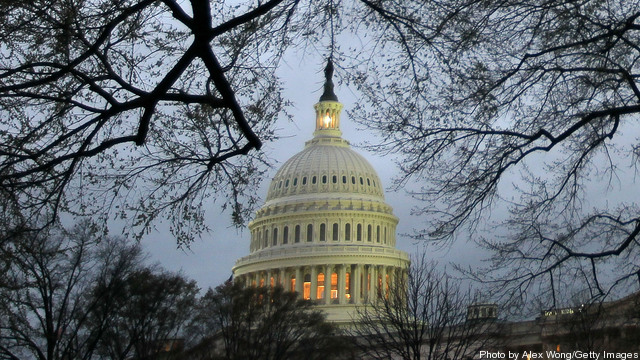The Washington, DC-based Institute for Energy Research’s message is clear: Government intervention in energy markets is counter-productive. The organization believes this to be the case even in dealing with climate change.
The IER is a think tank with an emphasis on a free market approach to energy. Its papers cover issues ranging from carbon taxes to power plant closures to the Alaska National Wildlife Refuge, and invariably find that policy efforts to shape the US energy landscape are more costly than beneficial.
“If you look at what’s going on in Washington, DC there’s sort of a major effort to reorganize where we get our energy sources from, how we get our energy sources and how we should be enlightened to choose alternatives to what has historically worked pretty well for various policy reasons,” IER President Tom Pyle told Breaking Energy.
“Our 800-foot level is that the government seems to get it wrong pretty much most of the time,” and “it’s across party lines”, Pyle said. “There’s no ownership on bad energy policy these days between Republicans and Democrats.”
Oil & Gas vs Renewables & Alternatives
The IER is not on board with ongoing policy efforts to shift the US economy towards diversification of the energy mix away from dependence on fossil fuels, efforts that have the public support of organizations ranging from the Natural Resources Defense Council to security-focused think tank the American Security Project, but attract plenty of critics, as well. “We have a preference for the sources of energy that work,” Pyle said.
He questioned various administrations’ efforts to push the US energy future in a variety of directions through measures such as the ethanol mandate and federal incentives for hydrogen-fuel and other alternative vehicles. And he put particular emphasis on statistics that feature prominently in discussions of the US’ current and future energy mix – that over 80% of our energy comes from coal, gas and oil, and will continue to do so.
“We’re spending all these resources on sources of energy that aren’t as valuable from a Btu perspective. Why not just let the marketplace sort it out?” Pyle asked. “We’re diverting the focus away from the next best thing, whatever that is.”
Pyle noted that efforts to transition a part of the vehicle fleet away from petroleum-based products have been more of a success when driven by economics than by policies. “In spite of attempts to subsidize the conversion of natural gas to transportation vehicles, which failed, thankfully, it’s still happened,” he said. “Companies that have bring-’em-back-to-the-barn type fleets, UPS and FedEx and others, they’re doing it. They don’t need a $7,500-$8000 tax credit for each vehicle.”
He added that the same has proved true of switching from coal-fired to gas-fired power plants. “Even without the EPA regs on coal, it’s cheaper to build a gas-fired plant, it comes up faster, you don’t need nearly as much capital investment,” he said. “So when natural gas prices are really low, people make the switch.”
What About Climate Change?
Breaking Energy asked Pyle about an issue that features prominently in discussions of energy policy – and is widely expected to be the subject of a speech by US President Barack Obama tomorrow – but is not directly addressed in IER’s research. How can a free market approach tackle climate change?
“None of the policy solutions that have been proposed to date will do one thing to reduce global average temperatures in any way, shape or form,” Pyle said. “What we would end up doing here is sort of a unilateral economic disarmament situation where we’ve sort of thrown our hands up and said ‘we’re going to do this because of this goal, but it’s not going to actually achieve any meaningful results’.”
Even on the issue of mitigation – attempting to slow the rise of global average temperatures – Pyle said that allowing developing economies to reach the comfort level of US citizens will naturally lead to cleaner air.
“Wealthier nations are cleaner,” he said. “They have better environmental standards, the cost of doing business is significantly higher, and so that to me is sort of the answer.”
When asked whether that is due, in part, to stricter environmental standards in wealthier countries, he responded that “we have more resources to put a value on environmental protection…it’s certainly profitable to be efficient, so there’s no downside to reducing waste.”
He added that energy industry players with an interest in maintaining the long-term relationships they need to continue operating will self-police. “The market has a tendency to weed out bad actors,” Pyle said. “The oil spill in the Gulf is a great example. It’s a hell of a lot more expensive to spill oil than it is to sell it on the market.”
Many energy companies are heavily invested in reducing their energy consumption, which can have a dramatic effect on costs. And BP’s post-Macondo costs spiralled into the tens of billions of dollars.
But it is difficult to draw close parallels between one-time incidents such as the 2010 Gulf oil spill and ongoing carbon dioxide emissions. As long as there is no price on carbon, it is not necessarily expensive to emit. From a public relations perspective, evidence visible to the average citizen in the form of oil-soaked pelicans is likely to have a much more dramatic effect on public perception than evidence in the form of dry statistics on tons per year of carbon dioxide emitted.

